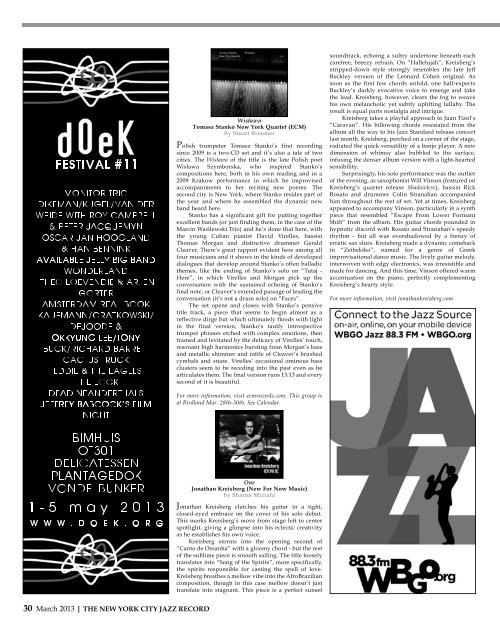Create successful ePaper yourself
Turn your PDF publications into a flip-book with our unique Google optimized e-Paper software.
30 March 2013 | THE NEW YORK CITY JAZZ RECORD<br />
Wisława<br />
Tomasz Stanko New York Quartet (ECM)<br />
by Stuart Broomer<br />
Polish trumpeter Tomasz Stanko’s first recording<br />
since 2009 is a two-CD set and it’s also a tale of two<br />
cities. The Wisława of the title is the late Polish poet<br />
Wisława Szymborska, who inspired Stanko’s<br />
compositions here, both in his own reading and in a<br />
2009 Krakow performance in which he improvised<br />
accompaniments to her reciting new poems. The<br />
second city is New York, where Stanko resides part of<br />
the year and where he assembled the dynamic new<br />
band heard here.<br />
Stanko has a significant gift for putting together<br />
excellent bands (or just finding them, in the case of the<br />
Marcin Wasilewski Trio) and he’s done that here, with<br />
the young Cuban pianist David Virelles, bassist<br />
Thomas Morgan and distinctive drummer Gerald<br />
Cleaver. There’s great rapport evident here among all<br />
four musicians and it shows in the kinds of developed<br />
dialogues that develop around Stanko’s often balladic<br />
themes, like the ending of Stanko’s solo on “Tutaj -<br />
Here”, in which Virelles and Morgan pick up the<br />
conversation with the sustained echoing of Stanko’s<br />
final note, or Cleaver‘s extended passage of leading the<br />
conversation (it’s not a drum solo) on “Faces”.<br />
The set opens and closes with Stanko’s pensive<br />
title track, a piece that seems to begin almost as a<br />
reflective dirge but which ultimately floods with light<br />
in the final version, Stanko’s tautly introspective<br />
trumpet phrases etched with complex emotions, then<br />
framed and levitated by the delicacy of Virelles’ touch,<br />
resonant high harmonics bursting from Morgan’s bass<br />
and metallic shimmer and rattle of Cleaver’s brushed<br />
cymbals and snare. Virelles’ occasional ominous bass<br />
clusters seem to be receding into the past even as he<br />
articulates them. The final version runs 13:13 and every<br />
second of it is beautiful.<br />
For more information, visit ecmrecords.com. This group is<br />
at Birdland Mar. 28th-30th. See Calendar.<br />
One<br />
Jonathan Kreisberg (New For Now Music)<br />
by Sharon Mizrahi<br />
Jonathan Kreisberg clutches his guitar in a tight,<br />
closed-eyed embrace on the cover of his solo debut.<br />
This marks Kreisberg’s move from stage left to center<br />
spotlight, giving a glimpse into his eclectic creativity<br />
as he establishes his own voice.<br />
Kreisberg storms into the opening second of<br />
“Canto de Ossanha” with a gloomy chord - but the rest<br />
of the sublime piece is smooth sailing. The title loosely<br />
translates into “Song of the Spirits”, more specifically,<br />
the spirits responsible for casting the spell of love.<br />
Kreisberg breathes a mellow vibe into the AfroBrazilian<br />
composition, though in this case mellow doesn’t just<br />
translate into stagnant. This piece is a perfect sunset<br />
soundtrack, echoing a sultry undertone beneath each<br />
carefree, breezy refrain. On “Hallelujah”, Kreisberg’s<br />
stripped-down style strongly resembles the late Jeff<br />
Buckley version of the Leonard Cohen original. As<br />
soon as the first few chords unfold, one half-expects<br />
Buckley’s darkly evocative voice to emerge and take<br />
the lead. Kreisberg, however, clears the fog to weave<br />
his own melancholic yet subtly uplifting lullaby. The<br />
result is equal parts nostalgia and intrigue.<br />
Kreisberg takes a playful approach to Juan Tizol’s<br />
“Caravan”. His billowing chords resonated from the<br />
album all the way to his Jazz Standard release concert<br />
last month. Kreisberg, perched on a corner of the stage,<br />
radiated the quick versatility of a banjo player. A new<br />
dimension of whimsy also bubbled to the surface,<br />
infusing the denser album version with a light-hearted<br />
sensibility.<br />
Surprisingly, his solo performance was the outlier<br />
of the evening, as saxophonist Will Vinson (featured on<br />
Kreisberg’s quartet release Shadowless), bassist Rick<br />
Rosato and drummer Colin Stranahan accompanied<br />
him throughout the rest of set. Yet at times, Kreisberg<br />
appeared to accompany Vinson, particularly in a synth<br />
piece that resembled “Escape From Lower Formant<br />
Shift” from the album. His guitar chords pounded in<br />
hypnotic discord with Rosato and Stranahan’s speedy<br />
rhythm - but all was overshadowed by a frenzy of<br />
erratic sax slurs. Kreisberg made a dynamic comeback<br />
in “Zeibekiko”, named for a genre of Greek<br />
improvisational dance music. The lively guitar melody,<br />
interwoven with edgy electronics, was irresistible and<br />
made for dancing. And this time, Vinson offered warm<br />
accentuation on the piano, perfectly complementing<br />
Kreisberg’s hearty style.<br />
For more information, visit jonathankreisberg.com


